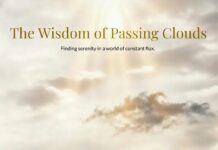Delusion Series, Part10 –Delusion, Sensation, and Impulse
Hello, dear friends!Welcome to this episode of the podcast, brought to you by the Australia Buddhas’ Practice Incorporated.
Today, we’re exploring the topic of delusion, sensation, and impulse. These three are like demons lurking in our minds. If we fail to recognize and manage them, they can lead us astray and even bring catastrophic consequences. Let’s dissect their essence and discover the path to replacing delusion with wisdom.
1. Delusion: The Rashomon of Life
First, let’s talk about delusion. Delusion doesn’t come out of nowhere—it originates from our past experiences, the memories and impressions gathered through our six senses (eyes, ears, nose, tongue, body, and mind). These memory data, when intertwined with afflictions such as greed, anger, ignorance, pride, and doubt, give rise to delusion. The defining trait of delusion is that it’s not merely raw memory but a product processed through our subjective emotions and biases.
For instance, when I say something to you, I might assume you’ve understood me. But your “understanding” and my version of “understanding” are often not the same. This is the Rashomon effect in human interactions—each of us wears tinted glasses, interpreting the same thing based on our own experiences and preferences. The outcome? You may dislike what I say, feel aversion, and while you grasp the surface of my words, my intended meaning is entirely missed. This is the harm of delusion: it makes us think we’ve grasped the truth, yet it silently creates misunderstanding and conflict.
Even more dangerously, delusion guides us to make flawed judgments. For example, I might find something wonderful and eagerly share it with others, without considering whether they agree with my sense of “wonderful.” When they don’t appreciate it, I feel wronged, grumbling, “Like a dog biting the hand that feeds it!” This is actually a false view at play—I failed to clarify their perspective and acted solely on my delusion, ultimately hurting both myself and others.
2. Sensation: The Bias Rooted in Conditioning
Next, let’s look at sensation. Sensation is not delusion itself, but delusion incorporates the data provided by sensation. The root of sensation lies in the conditioning we receive early in life—each person’s definition of good, bad, right, or wrong is unique, shaped by their upbringing and solidified into their consciousness, or cognitive framework.
Take a simple example: I used to believe eating a bowl of rice with a few pieces of tofu daily was the healthiest, simplest lifestyle, because it fit my definition of “good.” But later, I realized this diet caused nutritional imbalances—too much tofu “overloaded” me, while the lack of other nutrients left me “starving.” This is the deception of sensation—it’s not objective truth but a product of our conditioned perceptions.
Another example: a Shanghainese host might treat a Sichuanese friend to the finest Shanghai cuisine, thinking it’s far better than “village food.” But the Sichuanese friend might find it unpalatable and never return. This is the consequence of acting on sensation. We assume our standards are universal, ignoring the unique preferences of others.
3. Impulse: The Amplifier of Delusion and Sensation
When delusion and sensation combine, they ignite impulse. Impulse comes in two forms: outward and inward. Outward impulse manifests as lashing out—verbally or physically attacking others without restraint. Inward impulse is more subtle—on the surface, you remain calm, but inside, you’re plotting how to “deal” with someone, only holding back out of fear of consequences.
The root of impulse lies in our overconfidence in delusion and sensation. We believe our delusions are true and our sensations are accurate, so when personal gain or loss is at stake, we act impulsively. For instance, when someone says something, I immediately pull up past memories to judge whether their words align with my preferences. If they do, I’m pleased; if not, I get angry or suspicious, wondering if they’re plotting something. This chain reaction stems from our blind faith in delusion and sensation.
4. Confidence or Delusion? The Root of False Views
In Buddhist teachings, this blind trust in delusion, sensation, and impulse is called inversion or false views. We think we’re confident, but in reality, we’re clinging to a flawed sense of “self.” To protect this self, we may harm others or even sacrifice our own well-being.
For example, to prove I’m better than someone else, I might discredit them, attack them, or “trample them underfoot.” This isn’t because I disbelieve their reasoning—it’s because I’m overly attached to my own afflictions and delusions. This kind of confidence is an inversion, trapping us in endless conflict and isolation.
If we keep following delusion, sensation, and impulse, we risk becoming isolated. Others find us unbearable, and we find everyone else irritating, leaving only misunderstanding and division between us.
5. Breaking Free from Delusion: The Path of Wisdom
So, how do we escape the traps of delusion, sensation, and impulse? The answer is: replace delusion with wisdom. Wisdom isn’t innate—it’s cultivated through discerning observation, or what we call “skillful discernment.” What is skillful discernment? It’s acting according to rules.
6. Conclusion: Awakening from Delusion
Friends, delusion, sensation, and impulse are three traps in our minds. They distort our perception of the world, harm others, and ultimately harm ourselves. But by recognizing their roots—past experiences, afflictions, and conditioned perceptions—we can replace delusion with wisdom and impulse with rationality.
Thank you for listening! See you next time!





